Daily Vocabulary Words: List of Daily Used Words in Leading Indian Newspapers
Hi there. Welcome to this special section @ Wordpandit. Our endeavour here is straightforward: highlighting daily vocabulary words that you would come across in leading newspapers in the country. We have included the following newspapers in our selection:
• The Times of India
• The Economic Times
• Hindustan Times
• Mint
• Indian Express
We are putting in extensive work to develop your vocabulary. All you have to do is be regular with this section and check out this post daily. This is your repository of commonly used words; essentially, we are posting a list of daily used words. Hence, this has significant practical application as it teaches you words that are commonly used in leading publications mentioned above.
Visit the website daily to learn words from leading Indian newspapers.
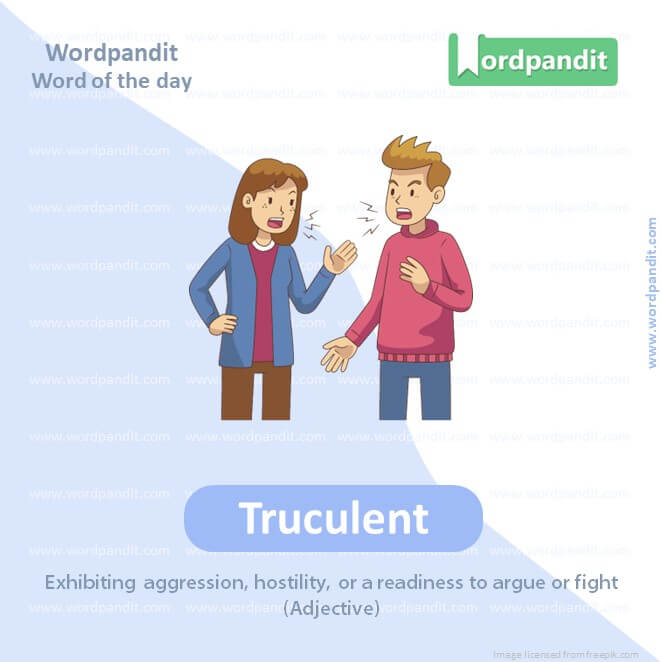
WORD-1: Truculent
CONTEXT: Truculent response from the opposition party indicated a long parliamentary battle ahead.
SOURCE: Times of India
EXPLANATORY PARAGRAPH: Imagine someone who always seems angry and ready to argue or fight. That’s what truculent means. It’s like meeting a grumpy bear who growls a lot.
MEANING: Exhibiting aggression, hostility, or a readiness to argue or fight (Adjective).
PRONUNCIATION: TRUK-yuh-luhnt
SYNONYMS: Aggressive, Belligerent, Combative, Hostile, Pugnacious.
USAGE EXAMPLES:
1. The truculent attitude of the player led to a penalty in the game.
2. He approached the debate with a truculent demeanor.
3. The truculent child refused to share his toys.
4. Her truculent response surprised everyone.
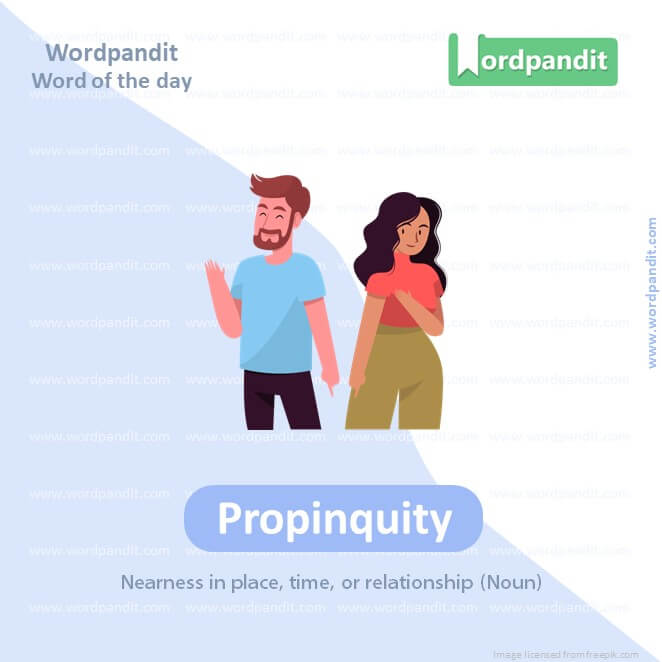
WORD-2: Propinquity
CONTEXT: The propinquity of the two events led many to believe they were connected, though no evidence suggested such.
SOURCE: Indian Express
EXPLANATORY PARAGRAPH: Propinquity is like being really close to something, not just in place, but maybe in time or relationship. Like your best friend who lives next door, or how summer vacation feels really close when it’s the end of the school year.
MEANING: Nearness in place, time, or relationship (Noun).
PRONUNCIATION: pruh-PING-kwih-tee
SYNONYMS: Proximity, Closeness, Nearness, Adjacency, Vicinity.
USAGE EXAMPLES:
1. The propinquity of the park to our house makes it a favorite spot.
2. Their propinquity at work led to a great friendship.
3. The propinquity of the deadlines increased our stress.
4. Family gatherings are special due to the propinquity of loved ones.
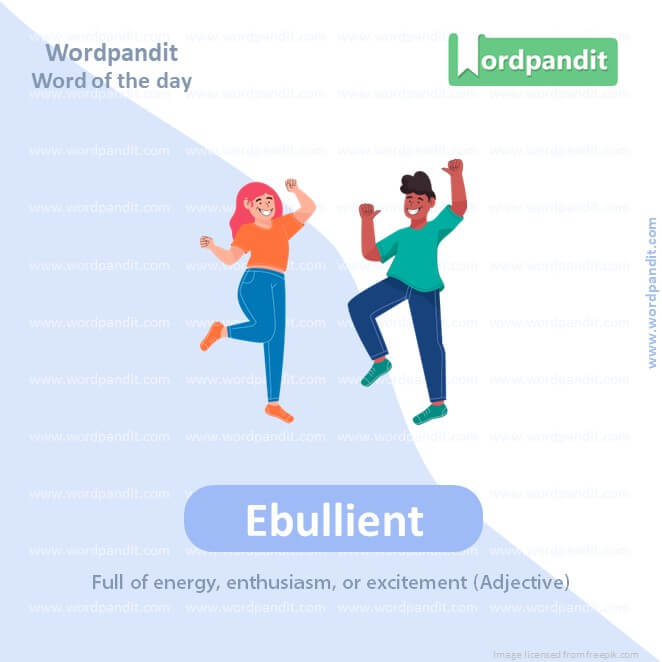
WORD-3: Ebullient
CONTEXT: The stock market showed an ebullient trend post the announcement of the new economic reforms.
SOURCE: Times of India
EXPLANATORY PARAGRAPH: Ebullient is when you’re so happy and excited, like when you’re bouncing around with joy because it’s your birthday, or you just found out you’re going to an amusement park.
MEANING: Full of energy, enthusiasm, or excitement (Adjective).
PRONUNCIATION: ih-BUL-yuhnt
SYNONYMS: Exuberant, Effervescent, Enthusiastic, Vivacious, Buoyant.
USAGE EXAMPLES:
1. Her ebullient personality lights up the room.
2. He gave an ebullient speech that motivated everyone.
3. The crowd’s ebullient cheers uplifted the team.
4. Ebullient children played at the party.
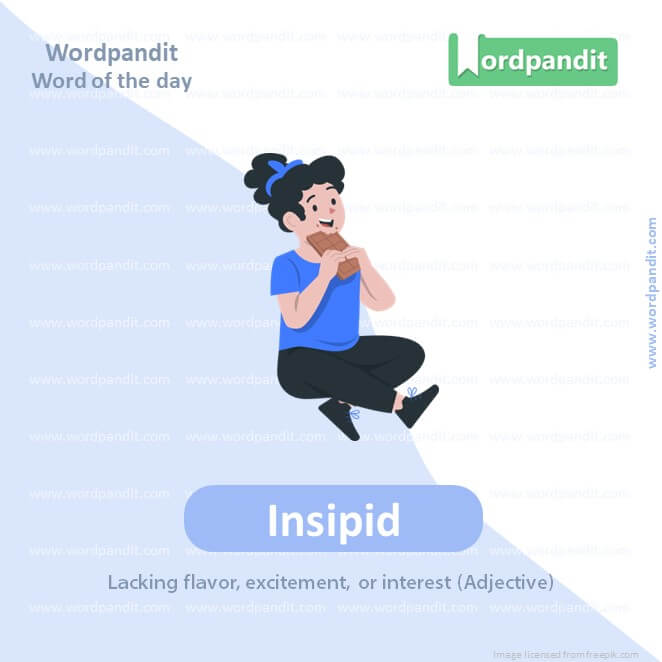
WORD-4: Insipid
CONTEXT: Critics labeled the film as insipid, lacking the depth and creativity expected from the acclaimed director.
SOURCE: Hindustan Times
EXPLANATORY PARAGRAPH: Insipid is when something is really boring or doesn’t have much flavor, like when you eat plain noodles without any sauce or spices.
MEANING: Lacking flavor, excitement, or interest (Adjective).
PRONUNCIATION: in-SIP-id
SYNONYMS: Bland, Dull, Flavorless, Vapid, Uninteresting.
USAGE EXAMPLES:
1. The soup tasted insipid without any spices.
2. The lecture was insipid and many students fell asleep.
3. He found the movie insipid and left halfway through.
4. Her insipid tone suggested she was bored.
WORD-5: Effulgent
CONTEXT: Effulgent beauty of the Taj Mahal at dawn has been a subject of countless poems.
SOURCE: Hindustan Times
EXPLANATORY PARAGRAPH: Effulgent is like something that’s shining really brightly, like the sun on a clear day, or a big, bright light in a dark room.
MEANING: Shining brightly, radiant (Adjective).
PRONUNCIATION: eh-FUL-jent
SYNONYMS: Radiant, Luminous, Bright, Brilliant, Glowing.
USAGE EXAMPLES:
1. The effulgent sun rose over the horizon.
2. Her effulgent smile brightened the room.
3. The effulgent lights of the city were mesmerizing.
4. The effulgent stars lit up the night sky.
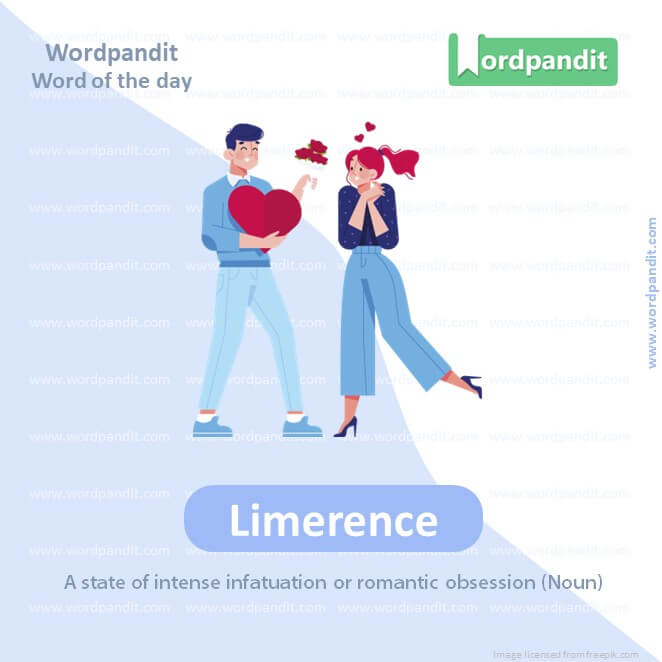
WORD-6: Limerence
CONTEXT: The protagonist’s limerence for his childhood love forms the central theme of the novel.
SOURCE: Times of India
EXPLANATORY PARAGRAPH: Limerence is like having a huge crush on someone, where you can’t stop thinking about them and you feel really excited and nervous whenever they’re around.
MEANING: A state of intense infatuation or romantic obsession (Noun).
PRONUNCIATION: LIM-er-ens
SYNONYMS: Infatuation, Obsession, Crush, Fascination, Enchantment.
USAGE EXAMPLES:
1. Her limerence for him was obvious to everyone.
2. He wrote poems in a state of limerence.
3. Limerence made her daydream all the time.
4. The movie depicted a young girl’s limerence for her classmate.
WORD-7: Impugn
CONTEXT: The defense sought to impugn the credibility of the key witness in the trial.
SOURCE: Indian Express
EXPLANATORY PARAGRAPH: Impugn is like when someone says that what you did or said isn’t true or isn’t good, kind of like accusing you of being wrong or dishonest.
MEANING: To dispute the truth, validity, or honesty of a statement or motive; to call into question (Verb).
PRONUNCIATION: im-PEWN
SYNONYMS: Challenge, Question, Dispute, Doubt, Contest.
USAGE EXAMPLES:
1. The lawyer impugned the witness’s credibility.
2. His motives were impugned by his colleagues.
3. The article impugned the politician’s integrity.
4. He impugned their claims during the debate.
WORD-8: Temerity
CONTEXT: Few had the temerity to challenge the established norms, but she did and changed the industry forever.
SOURCE: Indian Express
EXPLANATORY PARAGRAPH: Temerity is like being really brave, but in a way that might not be very careful, like daring to do something that others are afraid to do, without thinking much about the risks.
MEANING: Excessive confidence or boldness; audacity (Noun).
PRONUNCIATION: tuh-MER-ih-tee
SYNONYMS: Boldness, Audacity, Bravery, Nerve, Rashness.
USAGE EXAMPLES:
1. She had the temerity to question the boss.
2. His temerity in the face of danger was admirable.
3. The temerity to start a new business impressed his friends.
4. They showed temerity during the adventure.
WORD-9: Desultory
CONTEXT: The meeting was desultory, with no concrete decisions emerging from the discussions.
SOURCE: Times of India
EXPLANATORY PARAGRAPH: Desultory is like when you’re doing things without a plan or in a random way, like jumping from one thing to another, like playing a little bit of a game, then drawing, then reading, all without finishing anything.
MEANING: Lacking a plan, purpose, or enthusiasm; random or disconnected (Adjective).
PRONUNCIATION: DES-ul-tor-ee
SYNONYMS: Aimless, Random, Haphazard, Disconnected, Unsystematic.
USAGE EXAMPLES:
1. His desultory efforts led to poor results.
2. The conversation was desultory and unstructured.
3. She made a desultory attempt at cleaning her room.
4. The meeting was desultory and unproductive.
WORD-10: Disquisition
CONTEXT: His disquisition on ancient Indian architecture is considered a seminal work in the field.
SOURCE: Hindustan Times
EXPLANATORY PARAGRAPH: Disquisition is like giving a long talk or explanation about something, where you go into a lot of details, like when a teacher explains a big topic in class.
MEANING: A long, detailed discussion or written treatment of a subject (Noun).
PRONUNCIATION: dis-kwuh-ZISH-un
SYNONYMS: Dissertation, Treatise, Essay, Monograph, Exposition.
USAGE EXAMPLES:
1. The professor’s disquisition on economics was enlightening.
2. She wrote a lengthy disquisition on ancient Rome.
3. His disquisition covered every aspect of the topic.
4. The conference featured a disquisition by a renowned scientist.
Vocabulary list
In navigating the seas of language learning, a ‘vocabulary list’ can often be a dependable guiding star. These collections of words serve as a focused learning tool, yet the technique of mastering a ‘vocabulary list’ effectively requires more than simple perusal. It calls for a smart, sustained approach that amalgamates understanding, memory, and application.
Exploring a ‘vocabulary list’ should be more than a one-way trip. It ought to be more like a round trip, wherein you learn the words, come back to review them, and then set out again for a new voyage. This repeated interactive way of exploring the ‘vocabulary list’ aids in solid memory retention and effective learning.
Next, while dealing with a ‘vocabulary list’, employing memory-boosting techniques can bolster your retention substantially. Here, mechanisms like spaced repetition systems and flashcards can simplify and streamline the process. Moreover, associating words on your ‘vocabulary list’ with visual cues or personal stories can help your brain make strong connections, strengthening your recall ability.
However, the most crucial aspect of learning from a ‘vocabulary list’ is active application. Conquering a list without using the words in real-world contexts might leave you with fleeting knowledge. Hence, make it a point to integrate these learnt words into your daily interactions, be it on social media, in email exchanges, or casual conversations. The regular utilization reinforces your understanding and brings the ‘vocabulary list’ to life.
Conclusively, the ‘vocabulary list’ is a treasure trove in a language learner’s quest, waiting to be unlocked strategically. Through the trinity of review, memory-enhancing techniques, and active application, one can master any ‘vocabulary list’. So, take charge of your learning journey and set sail with your ‘vocabulary list’, charting the vast and fascinating seas of language.













